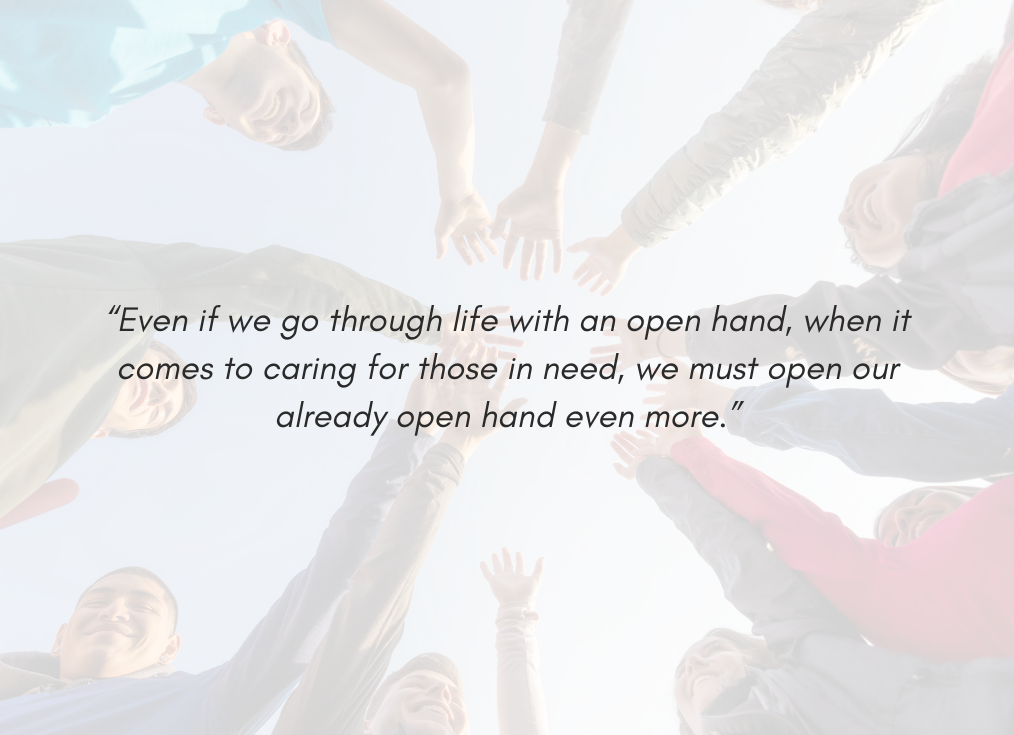The Open Hand of Tzedakah

In this week’s parashah, Re’eh, we encounter a powerful phrase that encapsulates the essence of tzedakah (charity): “patoach tiftach” – “open, your open hand” (Deuteronomy 15:8). This seemingly redundant expression has captivated the minds of our sages for generations, each offering unique insights into its deeper meaning.
Rashi, the esteemed medieval commentator, interprets this repetition as an emphasis on the importance of repeated generosity. We are called not just to give once, but to give many times over. Ibn Ezra, on the other hand, sees in this phrase a beautiful image of reciprocity – the open hands of both the giver and the receiver. The Or Hachaim takes this idea further, suggesting that Gd will open Gd’s hand to those who open theirs to others. From this, we are introduced to the vision that the donor is blessed and will receive more than their donation in return.
Rabbeinu Bahya offers yet another perspective, interpreting the phrase as a call to give even when the recipient is reluctant to accept. This understanding transforms tzedakah from a voluntary act into an obligation, a duty we must fulfill regardless of the recipient’s stance.
…
The very language we use to discuss this concept reveals its profound nature. The English word “charity” derives from the Latin “cherite,” meaning caring. However, the Hebrew “tzedakah” stems from the root צ-ד-ק, meaning “righteous.” This linguistic distinction underscores the Torah’s view of charitable giving not as an optional kindness, but as an essential act of righteousness.
As I reflected on these interpretations and the phrase itself, I was struck by the mindset it implies. The person with an “open hand” is inherently generous, constantly seeking to support and invest in those most in need. These are individuals who strive to do good every day, living with compassion and care for others.
Yet, the Torah’s use of “patoach tiftach” – “open, you shall open” – suggests that even this baseline of generosity is not enough. Even if we go through life with an open hand, when it comes to caring for those in need, we must open our already open hand even more. This teaches us that there is always room for growth in our giving, always an opportunity to stretch ourselves further in support of others.
This system of mutual care and responsibility is not accidental. Gd could have created a world where every physical need was automatically met. Instead, Gd designed a world where we depend on one another, where our physical and emotional needs are intertwined with the act of giving and receiving. This system, when functioning as intended, ensures that everyone’s needs are met while fostering deep connections between individuals and communities.
As we reflect on this parashah, let us acknowledge the many ways we already live with an “open hand” – the daily acts of kindness, the support we offer to friends and family, the donations we make to causes we believe in. These are all beautiful expressions of our innate generosity. But let us also challenge ourselves to look for opportunities to “open our [already] open hand” even further.
Where can we give more generously? Who in our community might need support that we have overlooked? How can we stretch ourselves to embody the spirit of “patoach tiftach” more fully?
By embracing this call to expanded generosity, we not only fulfill the mitzvah of tzedakah but also participate in the divine system of care and interconnection that sustains our world. May we all be blessed to give generously and to receive abundantly in return. Because we are…
Shabbat Shalom.

